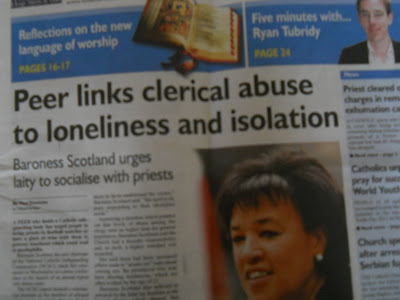This blog provides information about the policies and practices of the Catholic Church in England and Wales in relation to its response to the abuse of children by some of its priests.
Search This Blog
Monday, August 8, 2011
THE STONES CRY OUT: REPORT ON THE MACSAS SURVEY 2010
http://www.macsas.org.uk/PDFs/News/macsas_survey2010/MACSAS_SurveyReportMay2011.pdf
Amongst a wealth of information and very thorough and careful analysis, the MACSAS report concludes that
"... there has yet to be any radical change to the denial and minimisation of child sexual abuse seen within the Catholic Church over the past two decades." (P 79, paragraph 2.1.2.74)
Sunday, August 7, 2011
Should we be surprised that survivors are calling for Scotland's resignation?

The only ‘evidence’ Baroness Scotland cites for her headlined view comes from the John Jay Institute for Faith, Society and Law in the United States. This is a famously conservative institute founded in 2005 (see http://www.johnjayinstitute.org/about-us/core-principles/ and http://www.gazette.com/articles/-29593--.html#ixzz1UKgr2JJF). Its report into the clerical abuse of children in the USA between 1950 and 2002 has been criticised on a number of grounds.
In particular, critics have noted that the researchers concentrated their attention on a very narrow definition of “paedophile" as someone who only has sex with children under 10; thus, excluding the overwhelming majority (19 out of 20) of cases where priests had abused children and young people.
The data provided by the JJI report has also been cited by many Church organisations in recent years as ‘evidence’ that there has been a steady decline in the incidence of reported abuse of children by Catholic priests from about 1980 onwards and that the clerical abuse crisis is gradually drawing to a close. Unfortunately, for these apologists, the report that Baroness Scotland was launching on 28 July 2011 demonstrates that this is far from being the case. As the Universe reports “The latest figures showed the number of alleged abusers rising to 92 last year from 43 in 2009, with the number of allegations of abuse increasing to 83 from 41 over the same period.”, while, in England and Wales, “Eighteen people alleged they were abused in 2010, the same number who had alleged abuse occurring in 2009”.
As the person who heads the body supposedly responsible for monitoring the Church’s compliance with its declared policies on child protection, Baroness Scotland would perhaps be well-advised to widen her reading about issues relevant to the sexual abuse of children and young people.
Firstly, before deciding that the minority of Catholic priests who abuse would be prevented from doing so, if only the laity would share a glass of wine with them, she might, for example, have read Anne-Marie Mcalinden’s 2006 article on grooming (‘Setting ’Em Up’: Personal, Familial and Institutional Grooming in the Sexual Abuse of Children, Social and Legal Studies, 15: 339-362). Mcalinden highlights the facts that the majority of children are abused by someone well known to them and that offenders may groom not only the child but also their family and even the local community who may act as the gatekeepers of access, while sex offenders may groom criminal justice and other institutions into believing that they present no risk to children. She notes that a key variable in the grooming process is the creation and subsequent abuse of trust.
Secondly, before deciding that the minority of Catholic priests who abuse would be prevented from doing so, if only the laity would go with them to a football match, she might, for example, have read Kevin Williams’ 2010 article (‘Vicarious liability of the Roman Catholic Church for sexual abuse by a priest’, Journal of professional negligence, 26: 113-117) where he describes the case of a priest (C) who abused the appellant (M) when he was 12 or 13 years old. Williams (2010: 113) reports that the priest (C) “focused mainly on working with local children and youths regardless of any religious beliefs they might or might not have, running activities such as a social club, discos, and football teams.” (emphasis added).
Saturday, August 6, 2011
Abuse victims demand Baroness Scotland quit
Child abuse victims' groups are calling for the resignation of Baroness Scotland as leader of the Church's safeguarding authority after she appeared to suggest that Catholics should socialise more with priests to prevent them from abusing. The Shadow Attorney-General, who chairs the National Catholic Safeguarding Commission (NCSC), told journalists that Catholics should have a glass of wine or watch football matches with priests. Speaking at the launch of the commission's report last week, she said that those who abuse are often lonely and "unsupported emotionally". Minister and Clergy Sexual Abuse Survivors (MACSAS) and the National Association of People Abused in Childhood (NAPAC) told The Tablet that Baroness Scotland should stand down.
Friday, August 5, 2011
A very disturbing insight into the thinking of Vatican officials
From http://www.thetablet.co.uk/latest-news.php'
Accused priests treated worse than terrorists' – Vatican official
4 August 2011Priests accused of child abuse are denied natural justice and treated worse than terrorist suspects, according to a Vatican official. Mgr David-Maria Jaeger, a judge at the Roman Rota, the Church's appeal court, has suggested that priests accused of abuse are "pilloried" by their superiors even if an allegation against them was made by a "disgruntled parishioner". Mgr Jaeger made his comments in response to a Tablet blog posting that suggested an abuser going to confession should be required by the priest to give themselves up to police as a condition of absolution - a proposal he described as "outlandish."